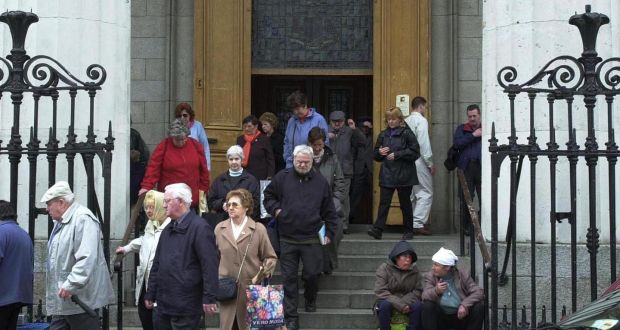Ez 2:2-5
Ps 123:1-2, 2, 3-4
2 Cor 12:7-10
Mk 6:1-6
I have been thinking quite a bit recently – in different contexts in my life – on the state of faith and Christian life in the United States. There is the rise of the nones, the by-now famous point from Pew Research Forum about the group of people who do not affiliated with any religious tradition, and how that group surpasses Catholics in terms of numbers. There are the young adult children of long-time friends – friends from across the Catholic ideological spectrum who wring their hands and worry about their children leaving the faith. “What did I do wrong?” they wonder, as they muse on having taken their kids to daily mass, or tried to celebrate saints’ days in a fun way, or promoted retreats and Eucharistic adoration, or any number of activities. They feel like they failed.
More overlooked are the adults in their 50s, 60s, and older who are disgusted with bishops’ and clergy members’ non responses to various crises who just proclaim, “I’m done with this.” And if I’m honest with myself, there’s me, and friends and maybe other people like me, who find this particular moment in the Church’s life to be really, really difficult to live into – this is a time of real and quite justified anger about how the Church and local parishes have often failed to respond well to the pandemic, addressed the sex abuse crisis, named the problems of racism and sexual harassment, or even simply preached the Gospel as opposed to giving diatribes from the pulpit that aim to score political points.
It is with all of this in mind that I’m reading Sunday’s mass readings. I find them to be both balm and caution.
For example, while the first reading from the prophet Ezekiel is aimed largely at what he might tell the Israelites who have turned away from God, God also gives Ezekiel a personal message: “whether they hear or resist” they shall know a prophet has been among them. How shall they know? Because Ezekiel proclaims, “Thus says the Lord God.”
There are two crucial points here, as I’m praying over this text. The first is “Thus says the Lord God” – Ezekiel is to proclaim God’s word and not his own. God has no doubt Ezekiel will do this. The question for us is discerning whether and how we proclaim God’s word – or do we privilege our own words instead?
Second, “whether they hear or resist,” we are called to proclaim. That takes the onus off of me, you, any individual or collective parish initiative, and so forth. I think often we (Christians as a whole and not only Catholics) focus on the numbers game: how many baptisms, how many deaths, what percentage of the population, and so forth.
But God’s proclamation to us is: the numbers are beside the point. Proclaim the Lord God whether they hear or resist. Our task is not to offer checklists, coerce, belittle, lie in order to get better results, or anything other than “to proclaim.” Not even God can coerce a person to follow him; why should we humans believe we are any different?
That, to me, is good news. Other peoples’ conversions are not up to me. Other peoples’ spiritual journeys aren’t up to me, either. What is mine is to proclaim – and that I must do with humility. Am I sure I am speaking a word from the Lord? That is a daunting task and not entered lightly. Nonetheless, if God calls, we should go.
Here, Ezekiel and Paul gird us up with words of encouragement: “I am content with weaknesses, hardships, persecutions, and constraints for the sake of Christ.” (verse 10) Again, I do not have to bust a gut or fake things to look better or braver or smarter or more genteel or more classily packaged: “when I am weak, then I am strong” for Christ.
And what is that good news? If you yourself do not have some good news to share with others (and I am hearing from a lot of people who aren’t seeing it or feeling it these days) then I think it’s time to sit back a bit and fall in love with Jesus again.
If on the other hand, you have a sense of what you need to proclaim – maybe something like:
- the mystery and majesty of God
- yet the radical hiddenness of God in this world of ours (who would expect otherwise from the One who appeared in a whisper, a burning bush, and a cloud)
- mercy and forgiveness – because, God help us, we are human and that means we and our human insitutions will nearly always be failing someone
- we are made in God’s image and given all the gifts and responsibilities that entails
- God is not an object in this universe and so we need not worry we’ll crush God
- God’s everlasting love especially as known in Jesus Christ
- response to God’s love means to love each other and God more
- ….
then try it. But today’s scriptures import us not to expect that we will “win” in any contemporary social sense of the word. “Winning,” as Ezekiel, Paul, and Jesus name, is quite beside the point.
Jesus gives encouragement as well, though of a slightly different type. “A prophet is not without honor except in his native place and among his own kin and in his own house.” (verse 4) He echoes Ezekiel and Paul here on looking and being weak, on accepting hardships, and more.
But he also points out that sometimes the places we must bring a word from the Lord is in our own house – perhaps our own parishes and the Church. This is very surely my “native place”. Here is where I have been formed and begun to learn to love – and yet here, too, there may be persecution.
Whether they (whoever the “they” is) hear or resist – what word of God’s shall we be about?





Thanks for writing this piece, Jana. Resonates in a number of respects.